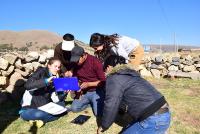Global Opportunities & Study Abroad
Students can participate in summer courses abroad or international exchange programs within their departments. They can also explore opportunities such as internships, practicums, fellowships, or immersive research projects with the Office of Global Health.
Global Health Programs
The National Taiwan University (NTU) Exchange Program provides WSPH master's and doctoral students with the opportunity to study at NTU's College of Public Health, accredited by the Council on Education for Public Health, during either the spring or fall semester. Participants will enroll in 9 to 12 credits, choosing from a diverse array of English-taught courses that cover a wide spectrum of public health topics. This program enriches students' academic knowledge and offers profound cultural immersion, thus broadening their perspectives on global health. Additionally, accepted applicants receive a $2,000 travel award to support their journey.
The UJMT Launching Future Leaders in Global Health (LAUNCH) Program supports mentored research training in global health for eligible doctoral and postdoctoral candidates.

Successful applicants spend 12 months abroad at one of 30 affiliated institutions in 17 countries, where they gain experience conducting research in international settings, covering a wide range of topics, including HIV/AIDS and other communicable diseases, child health, women’s health, environmental health, surgery, cancer, sickle cell, and others. All fellowship recipients are fully funded, covering research, stipend, travel, health insurance, and other associated costs. Additionally, fellows will conduct research under the guidance of a collaborating faculty member and participate in enriching group training activities at NIH with trainees from multiple consortia.
Study Abroad 2026 Info Session
This is the recording of February 2026's Study Abroad Fair. Learn more about summer programs course content, travel logistics, course fees, and how to register. Whether you're just exploring or ready to commit, this is a great chance to hear directly from faculty leading courses abroad.
Summer Abroad Programs
Italy
IHSD 6790 Food Security and Resilience
June 1 - June 14, 2026

This Italy-based course provides an in-depth examination of the impacts of rapidly globalizing food systems on food and nutrition security at various levels, highlighting the increased attention and resources directed at enhancing food security, nutrition, and sustainability. The course addresses global economic and political dynamics affecting food systems and habits, including climate change, transboundary pests, price volatility, and resource competition. Comparisons between industrialized and diverse global food systems will be made to assess resilience and fragility, with a focus on the role of gender in shaping food policies and nutritional outcomes. Hosted in Italy, near Rome-based UN food agencies, the course includes visits to agencies like the UN Food and Agriculture Organization, the International Fund for Agricultural Development, and the Slow Food Academy, supplemented by lectures from experts at the University of Turin and various international organizations at the Bolsena Campus.
Taiwan
SBPS 6150 Taiwan Strategies to Community Health Practices
Not being offered in 2026 - New dates TBA

This course provides a field study opportunity in Taiwan to explore global public health practices, cross-cultural communication and interaction, and alternative community health strategies. Ten to 12 students from partner Universities in Taiwan (Asia University and China Medical University) are paired with 10-12 students from Tulane University to form cross-cultural teams to research and develop a plan to address community health concerns at the national, provincial, city, provincial and/or community levels. Lectures and discussions will be provided by experienced faculty from university partners, government officials, and field-based practitioners in Taiwan. The cross-cultural student teams must create a PowerPoint presentation on their identified community health concerns and submit a written field report.
Cuba
IHSD 6860 - Public Health in Cuba
May 24 - June 6, 2026

This immersive course in Havana, Cuba, examines how the Cuban government has prioritized strategies to achieve universal healthcare over the last six decades, with a special emphasis on efforts to strengthen primary healthcare and integrate it with more complex levels of care. The course contextualizes and analyzes programs aimed at preventing infant mortality and controlling infectious diseases, including polio, malaria, tuberculosis, dengue, HIV, and COVID-19, as well as the economic and political contexts in which these public health initiatives developed. The course takes place in partnership with the National School of Public Health of Cuba. It includes site visits to health facilities and community-based organizations.
Wyoming
IHSD 6470: Leadership for Sustainable Development in the Age of Disruption
June 28 - July 10, 2026
3 Credits

Discover Leadership and Resilience in Wyoming's Wilderness. This immersive two-week course in rural Wyoming blends leadership, sustainability, and adaptive strategies to tackle global disruptions. Through readings, discussions, and hands-on experiences in Wyoming's rugged terrain, explore public health leadership, disaster management, and groundbreaking solutions like telehealth. Engage with rural healthcare providers, indigenous communities, and crisis teams, and dive into case studies on Grand Teton National Park, conservation, and fracking debates. An optional three-day wilderness adventure caps off this transformative experience in a living laboratory of leadership and environmental stewardship.
Cape Town
IHSD 7050 Program Design and Evaluation for Vulnerable Children and Adolescents: Lessons from South Africa
Summer 2026, June 8-19

Spend your summer in Cape Town—a city of breathtaking beauty and innovation at the forefront of public health in Africa—learning how to make a real difference in the lives of children and adolescents facing adversity.
As home to the world’s largest HIV epidemic, South Africa offers a rare opportunity to study within a setting renowned for program innovation and research excellence. Based in Cape Town, this immersive two-week course equips students to design, implement, and evaluate evidence-informed programs for children and adolescents affected by HIV.
Through field visits, guest lectures, and applied coursework, students connect classroom learning with real-world contexts. Students explore how health, education, protection, and economic-strengthening initiatives come together to support young people. Grounded in rights-based and ecological frameworks, the course builds practical skills in program design, adaptive monitoring and evaluation, and stakeholder engagement—all while navigating the ethical and operational realities of delivering high-impact services in low-resource settings.
Students synthesize their learning through applied assignments such as case study analysis, evaluation critiques and simulated donor pitches, gaining firsthand insight into South Africa’s leading HIV prevention and care models. Led by a Tulane professor with more than fifteen years of in-country experience, this course offers an unforgettable opportunity to learn from South Africa’s innovation, resilience, and global health leadership.
Interested? Contact: Professor Tonya Thurman tthurma@tulane.edu.
Tropical Medicine Labs & Practical Skills
Peru
TRMD 6760 - From Theory to Practice: Public Health Field Skills in Peru
May 13 - May 29, 2026
This summer course (3 credits) will take place in two Peruvian locations: the Amazon rainforest basin city of Iquitos and the coastal capital city of Lima. This course aims to transform theoretical public health knowledge into practical skills in an international setting. Students will gain direct experience in a public health field site and practice various techniques, including GPS mapping, GIS geospatial analysis, environmental health risk assessments, mosquito collection (adult and larval), implementation science process mapping, participation in a simulated epidemiological investigation, as well as visits to public health sites and laboratories.
Interested? Contact Jford4@tulane.edu
Sierra Leone
TRMD 6340 - Diagnostic Methods in Microbiology
July 18–August 2, 2026
3 credits
Join Our Summer Laboratory Program in Sierra Leone! This immersive two-week program offers students hands-on training in public health, laboratory methods, and community-based research within the vibrant communities of Sierra Leone. Based primarily in Bo, the course includes exploration of nearby rural areas to provide a deeper understanding of healthcare challenges in resource-limited settings. The program covers hematology, parasitology, mycology, and molecular lab procedures, equipping students with essential skills for infectious disease diagnostics. Tulane University students will be partnered with Njala University students, fostering cross-cultural collaboration and hands-on learning to better understand public health challenges in a global context. Additionally, students can collaborate with local partners for their APE, enhancing their practical knowledge and field experience in an international setting.
Interested? Contact alever@tulane.edu or rlandry10@tulane.edu
